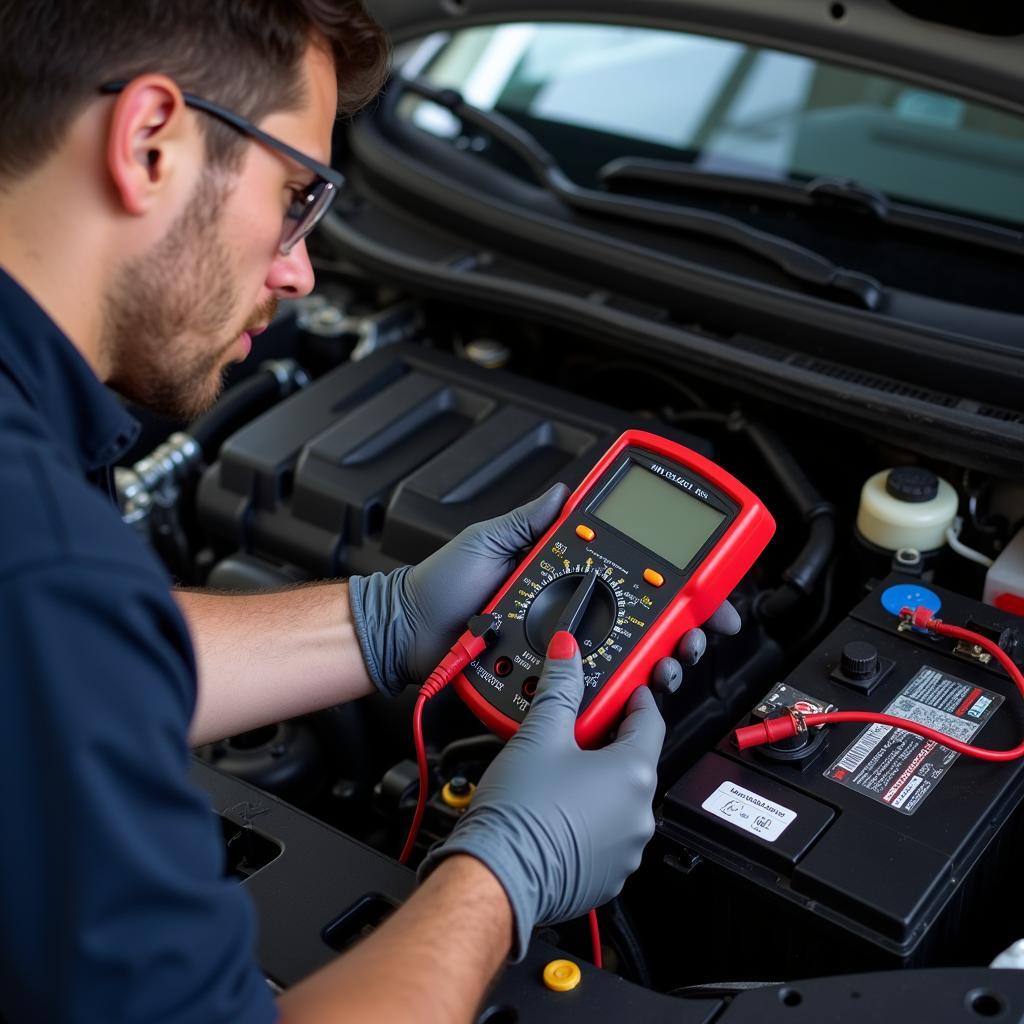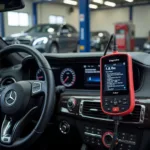Electrical repairs to cars are becoming increasingly complex with advancements in automotive technology. From simple blown fuses to intricate computer malfunctions, understanding the nuances of your vehicle’s electrical system is essential. This guide will provide you with a comprehensive overview of common electrical problems, diagnostic techniques, and repair options.
Understanding Your Car’s Electrical System
Modern vehicles rely heavily on intricate electrical systems for everything from powering the engine to controlling safety features. These systems encompass a vast network of components, including the battery, alternator, starter, wiring harnesses, sensors, and computer modules. A malfunction in any of these components can lead to a range of issues, from minor inconveniences to major breakdowns. electrical repairs on cars can vary greatly in complexity.
Common Electrical Problems in Cars
Some of the most common electrical problems drivers encounter include:
- Starting issues: Difficulty starting the engine can often be traced back to a faulty battery, starter, or alternator.
- Dim or flickering lights: This can indicate a problem with the alternator, battery, or wiring.
- Malfunctioning power windows or locks: Issues with power accessories can be caused by faulty switches, motors, or wiring within the door panels.
- Dashboard warning lights: Pay attention to warning lights on your dashboard, as they can signal various electrical problems.
- Audio system issues: Problems with the radio, speakers, or other audio components can often be related to wiring or fuse issues.
Diagnosing Electrical Problems
Diagnosing electrical problems requires a systematic approach and often specialized tools. While some issues may be easily identified, others require more in-depth analysis.
Tools for Diagnosing Electrical Faults
- Multimeter: A multimeter is essential for measuring voltage, current, and resistance in the electrical system.
- Scan tool: A scan tool can read diagnostic trouble codes (DTCs) stored in the vehicle’s computer, providing valuable insights into the root cause of the problem.
- Test light: A simple test light can help identify blown fuses, broken wires, and other basic electrical issues.
electrical repairs cars long beach offers specialized diagnostics for complex electrical systems.
Diagnostic Techniques
- Visual inspection: Carefully examine wiring harnesses, connectors, and components for signs of damage, corrosion, or loose connections.
- Circuit testing: Use a multimeter or test light to check for continuity and voltage drops in various circuits.
- Computer diagnostics: Use a scan tool to retrieve DTCs and access live data from the vehicle’s computer system.
“Accurate diagnosis is crucial for efficient and effective electrical repairs,” says John Smith, ASE Certified Master Technician. “Using the right tools and techniques can save both time and money.”
Electrical Repair Options
Depending on the complexity of the problem, electrical repairs can range from simple DIY fixes to more involved procedures requiring professional expertise.
DIY Electrical Repairs
Some simple electrical repairs that car owners can often tackle themselves include:
- Replacing blown fuses: Locate the fuse box, identify the blown fuse, and replace it with a new one of the same amperage.
- Cleaning battery terminals: Corrosion on battery terminals can lead to starting issues. Clean the terminals with a wire brush and baking soda solution.
- Replacing bulbs: Replacing burnt-out headlights, taillights, or interior lights is usually a straightforward process.
car electrics repairs provides more detailed information on specific repair procedures. For more complex issues, seeking professional help is recommended.
Professional Electrical Repairs
Complex electrical repairs, such as those involving computer modules, wiring harnesses, or sophisticated electronic components, often require the expertise of a qualified automotive technician. These professionals have the knowledge, tools, and experience to diagnose and repair intricate electrical systems effectively.
“Don’t hesitate to consult a professional for electrical problems you’re unsure about,” advises Jane Doe, Automotive Electrical Systems Engineer. “Attempting complex repairs without proper knowledge and tools can potentially worsen the problem.”
Conclusion
Electrical repairs to cars are an inevitable part of vehicle ownership. Understanding the basics of your car’s electrical system, common problems, and diagnostic techniques can help you address minor issues and make informed decisions when seeking professional assistance. Regular maintenance and prompt attention to warning signs can help prevent more significant and costly electrical problems down the road.
FAQs
- What is the most common cause of car electrical problems? Loose or corroded connections are a frequent culprit.
- How can I prevent electrical problems in my car? Regular maintenance, including battery checks and inspections, can help.
- What should I do if my car won’t start? Check the battery, starter, and alternator.
- Why are my headlights dim? This could be a problem with the alternator, battery, or wiring.
- How much do electrical car repairs typically cost? The cost varies depending on the complexity of the problem.
- When should I take my car to a mechanic for electrical repairs? If you are unsure about the cause of the problem or if it involves complex components.
- How can I find a reliable auto electrician near me? electrical car repairs bristol or electrical car repairs near me can be good starting points if you are in those areas.
Need further assistance with electrical repairs to cars? Contact us via WhatsApp: +1(641)206-8880, or Email: [email protected]. We have a 24/7 customer support team ready to help.



